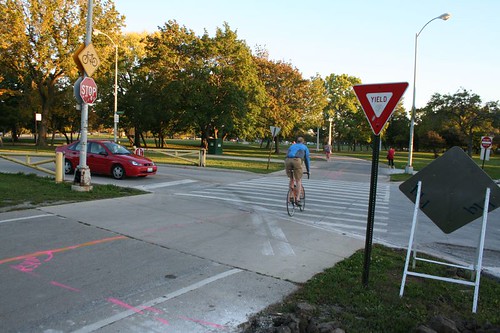If you're riding a bike in Illinois, you can feel just a little bit safer because a new law, known as "Dennis's Law," will go into effect on January 1, 2017. Dennis's Law states, simply, that the traffic laws apply equally to cars and persons riding bicycles. Specifically, "every person riding a bicycle upon a highway shall be granted all of the rights ... and shall be subject to all of the duties applicable to the driver of a vehicle by this Code..." To see the text of the new code provision, click here.
The new law comes on the heels of a 2015 fatal accident in which 68-year-old Hampshire, Illinois, resident, Dennis Jurs, was killed in a collision with a vehicle. To read about the accident, click here.
The driver involved in the accident with Jurs was stopped at an intersection. The driver had a stop sign. Jurs was approaching the intersection on his bike and did not have a stop sign. The driver failed to yield to Jurs and proceeded through the intersection, striking Jurs, and killing him. The driver was issued a citation for failing to yield the right-of-way to Jurs. But, later, a Kane County judge dismissed the citation against the driver for failing to yield the right-of-way because - in Illinois - a bicycle was not considered to be a vehicle entitled to all of the rights of the road.
Under Dennis' Law, cyclists will be "granted all of the rights” of motorists, including the right to be granted the right-of-way. The new law was apparently well-favored and passed through the Illinois House and Senate nearly unanimously, with only one vote against it.
In Pennsylvania, the Motor Vehicle Code, Title 75, defines a vehicle propelled solely by human-powered pedals as a “pedacycle.” A pedacycle is a “vehicle” for purposes of the Motor Vehicle Code. Because bicycles are propelled by human-powered pedals, people on bikes are considered to be operating “vehicles” upon the roadways and, therefore, they are generally afforded all of the rights of the Pennsylvania Motor Vehicle Code. However, we are also subject to all of the duties applicable to motorists. For a complete review of the laws applicable to cyclists in Pennsylvania, check out my prior post, here.
While Pennsylvania has some favorable bicycle laws, such as a four-foot passing law (note that Pa is currently the ONLY state with a four-foot requirement; other states have 3-foot, 2-foot, or no minimum distance required), Pennsylvania still does not treat bicycles completely equal to motor vehicles. Pennsylvania law also still permits local regulation of bicycle laws, rather than state-wide regulation and uniformity. As a result, local regulations in Philadelphia, for example, are more restrictive than those throughout the rest of the state. See here to review some of the restrictions applicable in Philadelphia.
Dennis's Law represents another move in the right direction for people on bikes. But we still have a long way to go.
Be safe out there and thanks for reading.
Matthew F. Dolfi, Esquire
Dolfi Law PC
1100 Washington Avenue, Suite 206
Carnegie, PA 15106
412-227-9724
Website:
www.dolfilawpc.com
Facebook page:
Important notice:
Dolfi Law PC
1100 Washington Avenue, Suite 206
Carnegie, PA 15106
412-227-9724
Website:
www.dolfilawpc.com
Facebook page:
Instagram:
Important notice:
The information provided in this blog article is not legal advice. The information and opinions provided herein are solely for the general interest of the visitors to this website. The information contained herein is only applicable to general principles of law in Pennsylvania and may not reflect current legal developments or statutory changes in various other jurisdictions. Therefore, the information and opinions contained in this blog should not be relied upon or interpreted as legal advice. No aspect of this blog article should be interpreted as establishing an attorney-client relationship between the reader and its author. Anyone reviewing this article should not act upon any information contained herein without first seeking the advice of legal counsel.
Search terms: Bicycle accident cases and lawsuits, Bicycle collisions, Bicycle safety, Bike accident lawsuits, Bike accidents, Bike collisions, Risks for bicycle riders, accident attorney, accident lawyer, bicycle, bicycle accident laws, bicycle accident, bicycle accident attorney, bicycle risks, bicycle safety, bike accident, cycling, defective road conditions, dangerous roads, dangerous streets, Pittsburgh, Pennsylvania, Matthew F. Dolfi, Matt Dolfi, Pittsburgh Bike Lawyer, Pittsburgh Bike Accident, lawyer-cyclist, The Lawyer Cyclist, dolfilaw, Dolfi Law PC




